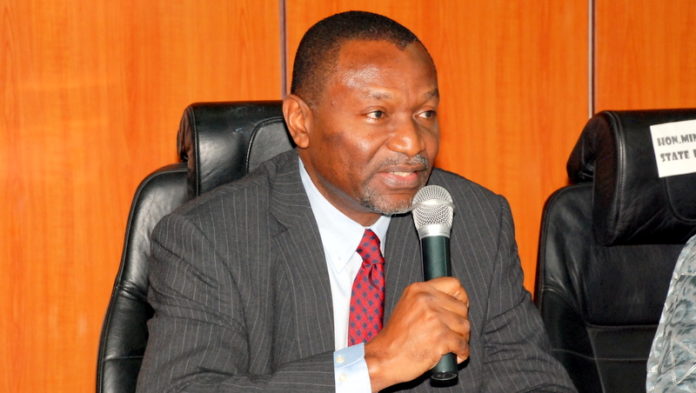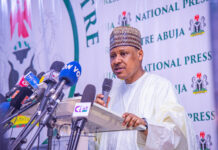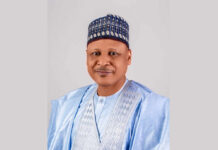LAGOS – (Federal Ministry of Budget & National Planning) – The Minister of Budget and National Planning, Udoma Udo Udoma (Senator) has said that the Federal Government is committed to diversification of the country’s economy away from dependence on oil and gas.
Udo Udoma disclosed this while delivering the keynote address at the 42nd Annual Conference Dinner of the Institute of Chartered Secretaries and Administrators of Nigeria (ICSAN) in Lagos. He explained that steps are being taken by the government towards expanding the exports of locally produced goods and services, stating that the ultimate aim is to reduce the current dependence on crude oil for most of the foreign exchange receipts.
In recalling that the present administration at inception met an economy in serious decline and took decisive measures to revive the economy, he stressed that this included the adoption of an expansionary fiscal budget in 2016. He later acknowledged that this helped to reflate the economy and stimulate economic activities. Adding, the 2016 Budget was underpinned by a Strategic Implementation Plan (SIP), consisting of a series of short-term measures aimed at boosting economic activities so as to restore confidence.
He maintained that the SIP was followed after extensive consultations with all segments of the society with the development of the Economic Recovery and Growth Plan (ERGP) 2017 – 2020 which was launched by the President in April, last year.
Speaking on the theme: ‘Exploring the Diversification Agenda Towards the Emergence of A Resilient Economy,’ the Minister was happy to note that the theme of the conference aligns completely with the aims and objectives of the ERGP. This, he said is because the ERGP was launched with the objective of first, leading Nigeria out of recession and thereafter, placing the economy on the path of growth that is diversified, inclusive and most importantly sustainable and resilient.
Agreeing with government’s commitment to expansion in the exports of locally produced goods and services as well as implementation of some critical aspects of the Plan, he hinted that a National Committee on Export Promotion (NCEP) has started implementing the Zero Oil Plan (ZOP) as set out in the ERGP. The NCEP, the Minister noted is working in close collaboration with the State Governments to promote the establishment of Domestic Export Warehouse and Aggregation Centres in each of the six geo-political zones of the country.
“The Committee is also promoting Project MINE and the acronym – ‘MINE’ stands for Made-in-Nigeria for Export. Under Project MINE, the Special Economic Zones will be used as the mechanism for making Nigeria the pre-eminent manufacturing hub in the Sub-Saharan Africa and a major exporter of Made-in-Nigeria goods and services regionally and globally,” he espoused.
“The project which has received the approval of the Federal Executive Council (FEC) has secured early commitments from domestic and foreign investors in textile and garments as well as agro-processing. Government is also reactivating the Export Expansion Grant (EEG) Scheme and the Export Development Fund (EDF) Scheme with the sum of N13.28 billion provided in the 2018 Budget.”
The Minister pointed out that the ERGP aims to expand and increase private sector investment, insisting that the Government has therefore prioritized improvements in the business climate to make Nigeria an attractive place for business to be conducted. According to him, the Presidential Enabling Business Committee (PEBEC) was set up to focus attention on this. He also informed that these efforts are bearing fruit as recent surveys conducted by the Nigeria Investment Promotion Commission (NIPC) has indicated that there has been a significant rise in interests in investing in Nigeria.
The Budget & National Planning Boss inferred that reports from the NIPC which regularly tracks new business announcements indicates that for the first three quarters of 2018 (January to September 2018), a total of $73.08 billion worth of proposed investments were announced for 65 projects in 18 States and the FCT. He added that the sectoral analysis of the announcements indicates 11 sectors of interest with mining and quarrying accounting for 43% of the total value, construction 25%, manufacturing 23%, electricity, gas, steam and air conditioning supply as well as transportation and storage each 3%, and the remaining sectors accounting for 2%.
“Though not all announcements become successfully executed projects, the increase in the announcement of proposed business projects does signal improved confidence in the economy. As part of the many initiatives government is introducing to help investors, Sector Specific Focus Labs in Agriculture and Transportation, Manufacturing and Processing and in Power and Gas were conducted early this year. These are some of the execution priority areas identified by the ERGP,” he emphasized.
The Focus Labs involve inviting potential investors to meet with key government officials and regulators with the objective of addressing any bureaucratic issues the investors might face in setting up projects in Nigeria. Some of the early successes recorded in this first set of Focus Labs were our development of a National Gold Development Policy and the establishment of a Federal Gold Reserve Scheme in Nigeria. After this first set we have been committed to holding more Focus Labs.”
Expressing his view on the developments, he described them as indications of significant progress, adding that not only is Nigeria out of recession, the country is beginning to grow again particularly in the non-oil sector. He further opined that the non-oil sector of the economy grew by 2.05% by the second quarter of this year, representing the strongest growth in the sector since the fourth quarter of 2015. He implied that the manufacturing sector which had experienced consistent quarterly contraction since Q1 2015 except in Q4 2015 has started growing again.
Continuing with the analysis, he allayed that at 0.68% in the Q2 2018, this growth is still quite low, but it is movement in the right direction. He stressed that the textile sub-sector improved from 0.2% in Q2 2017 to 2.73% in Q2 2018, while cement which contracted by -4.16% in Q2 2017 by Q2 of this year is now growing at 3.84%. He construed that though still very far from the targets these rates are very positive movements.
“By way of further illustration of the direction of movement, the Purchasing Managers’ Indices (PMI) for manufacturing which had consistently stayed below the 50 points threshold between January 2016 and April 2017 has risen to 56.8 index points in the month of October 2018. This indicates expansion in the manufacturing sector for the 19th consecutive month. This expansion was driven by improvements in business activities, production and employment across most sectors,” the Minister reiterated.
“Other economic indices are also improving. Inflation rates have maintained their declining trend. From a peak of 18.7% in January 2017, inflation started trending down gradually to 11.14% in July 2018. However, it went up slightly to 11.28% in September 2018. The external reserves have nearly doubled since September 2016 from $23.81 billion to $41.79 billion by early November this year.”
Udoma revealed that the exchange rate gap has narrowed and confidence in the economy is returning, indicating that capital inflows have risen from $710 million in the first quarter of 2016 to $5.5 billion by the second quarter of this year. He averred that supported by a gradual recovery in oil prices as well as the level of oil production, the country’s exports have grown by 59.5% from N8, 527 billion in 2016 to N13, 598 billion in 2017 and the trade balance has grown from a deficit of N290.1 billion in 2016 to a surplus of N4, 035.5 billion in 2017. The good news is that this increase in exports includes a significant increase in non-oil exports,” he inferred.
“The ultimate aim of government’s economic agenda is to get to a point that the country will be able to feed its people and have extra for export. We will be able to manufacture many of our basic requirements. We will be able to grow our non-oil exports to overtake our oil exports in value.”
He admitted that we are not yet where we want to be as we still have a lot more work to do to achieve a truly diversified economy. The Minister expressed confidence that the country is on the right track, saying there is no doubt in his mind that Nigeria is on the right track. He envisioned that if the Government consistently and faithfully continues with the implementation of the ERGP, Nigeria will become an economic production powerhouse.






